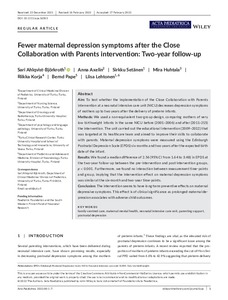Fewer maternal depression symptoms after the Close Collaboration with Parents intervention: Two-year follow-up
Ahlqvist-Björkroth Sari; Axelin Anna; Setänen Sirkku; Huhtala Mira; Korja Riikka; Pape Bernd; Lehtonen Liisa
https://urn.fi/URN:NBN:fi-fe2022081155052
Tiivistelmä
Aim: To test whether the implementation of the Close Collaboration with Parents intervention at a neonatal intensive care unit (NICU) decreases depression symptoms of mothers up to two years after the delivery of preterm infants.
Methods: We used a non-equivalent two-group design, comparing mothers of very low birthweight infants in the same NICU before (2001-2006) and after (2011-215) the intervention. The unit carried out the educational intervention (2009-2012) that was targeted at its healthcare team and aimed to improve their skills to collaborate with parents. Maternal depression symptoms were measured using the Edinburgh Postnatal Depression Scale (EPDS) six months and two years after the expected birth date of the infant.
Results: We found a median difference of 2.56 (95% CI from 1.64 to 3.48) in EPDS at the two-year follow-up between the pre-intervention and post-intervention groups, p < 0.001. Furthermore, we found no interaction between measurement time-points and group, implying that the intervention effect on maternal depression symptoms was similar at the six-month and two-year time-points.
Conclusion: The intervention seems to have long-term preventive effects on maternal depressive symptoms. This effect is of clinical significance as prolonged maternal depression associates with adverse child outcomes.
Kokoelmat
- Rinnakkaistallenteet [27094]
